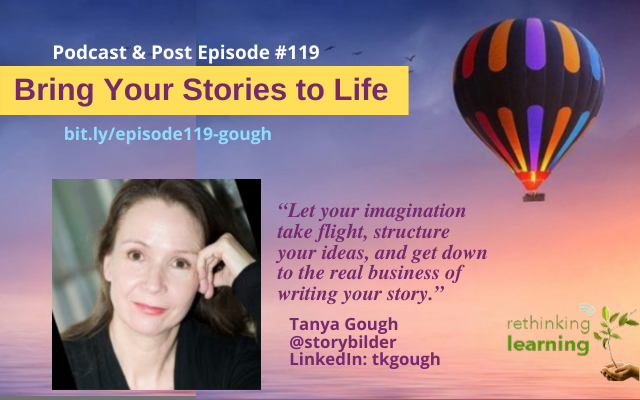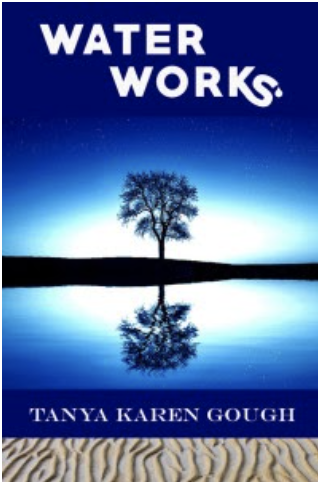
Podcast: Play in new window | Download
Subscribe: Spotify | TuneIn | RSS
Tanya Gough has been an ESL teacher, a retail store owner, a corporate digital marketer, and a freelance content strategist, intelligence researcher, and web developer. Today, she is the founder of StoryBilder, a creative writing platform for new and aspiring writers. Tanya also writes middle-grade fantasy fiction and science-infused fantasy short stories for adults.
Where did you grow up and what it was like when you were young?
I was born in Montreal in the early days of Quebec separatism when French activists were fighting for identity and political control of the province. We were anglophones in a French environment, and I attended kindergarten in English, first grade in French, and then was put back into English immersion classes for second grade because we knew we were moving to the US for my father’s work. I was eight when we moved to the NH seacoast. It wasn’t easy; I was Canadian, danced ballet, and listened to classical music at home, not exactly the model of all things cool by blue-collar NH standards those days.
Beyond that, it was the latchkey era, which meant that most of my friends and I were left to our own devices. I went everywhere on my own, made up plays in our barn, and built treehouses in the woods. In high school, I discovered the drama department, and, finally, a place where I belonged. After high school, I attended university at McGill in Montreal and have lived in Canada or abroad since, except for a couple of years here and there.
It must have been difficult moving to another country learning a new language and culture. What was it like for you as a student?
It wasn’t easy. First I had difficulties in Montreal adjusting to the whole English-French-English transition in school, and figuring out significant cultural differences between the two was always confusing. Then they dropped me in NH, which might as well have been the moon at that point, with a completely different set of social requirements that took me years to figure out. Eventually, I found my learning legs and developed a passion for reading and writing. In private school, I studied latin and published some stories in the middle school magazine. English was the one place I was allowed to thrive, for the most part. I also had an aptitude for math, particularly geometry, but the math teachers weren’t receptive to female students at that time. By the time I found one who was (in senior year calculus), it was too little too late. Luckily, my English teachers, all the way through high school, university, and grad school, supported me and gave me incredible opportunities to find my own way.
Through your experiences at school, you can tell you are an independent thinker. Were you always an entrepreneur and an “out of the box” thinker?
Yes, I’ve always been something of an overachiever, though I hate that expression. I guess I started working when I was 9, taking on babysitting jobs, more so when I was 10. I had my first paper route by 11 and did that until I was hired by the public library as a data processor at 14.
I’ve been working or “doing something” for as long as I can remember. I think that growing up in constantly changing environments forced me to find ways to adapt, and there were long in-between periods of isolation, which probably helped spark my creativity and self-reliance. I’m also inherently process-oriented, so I’m always looking for a better, more effective way to do things.
On the downside, I’m also deeply non-conformist, which got me in trouble at school a lot, but it’s the reason I’ve been able to make radical changes in my life, like moving to Japan to teach English or opening a CD & video store in Stratford, Ontario when I got back. I’m also opportunistic and take advantage of available resources when I can, which is why I was able to spin out a Shakespeare-specialty catalog from the shop and ended up with customers in 42 countries around the world. It’s also how I was able to transition my career into content management when I was no longer able to compete with emerging technologies and services like YouTube and Netflix.
You told me you were an English ESL teacher. Where did you teach ESL?
In Japan, twice. I was hired by the Japanese government to teach in junior high schools for a year right after I graduated from McGill. I was able to save enough to pay for grad school. After I finished my Masters’s degree at the University of Toronto, I went back and taught for another three years in Nagoya, working for Sony.
I loved the stories you told me about your middle-grade Fantasy books. I’m curious why you loved and wanted to write fantasy books.
Fantasy and science fiction have always been my escapist home. It’s what I remember most from the earliest age, and it’s what stayed with me through the years. Maybe it’s an offshoot from starting out with folk and fairy tales; I read all of the Andrew Lang Fairy Books, Hans Christian Anderson, and the Brothers Grimm as a kid, so fantasy and science fiction was the next logical step.
I lost track of genre fiction in university while I studied English literature and started reading heavily in world lit (I was particularly fond of Russian, Czech, and Japanese classics and contemporary fiction). When I started shutting down my shop and catalog in Stratford, I found it left a large hole in my heart, and fantasy was the only genre that seemed to fill it.
My adult short stories blend elements of both fantasy and science fiction because pure fantasy worlds don’t seem to be specific enough to reflect the world as I currently see it.
Books by Tanya
 Root Bound: How far will you go to find your way home? Emma and her father are always on the move, traveling from place to place as her father’s work demands. Their new home, however, is different. There’s a frightening woman who lives down the hall: she bears an uncanny resemblance to a witch. A mysterious light comes from her apartment, and a small boy seems to be trapped inside.
Root Bound: How far will you go to find your way home? Emma and her father are always on the move, traveling from place to place as her father’s work demands. Their new home, however, is different. There’s a frightening woman who lives down the hall: she bears an uncanny resemblance to a witch. A mysterious light comes from her apartment, and a small boy seems to be trapped inside.
School in this town is no happy place either, with an odd principal and a gang of girls who make tormenting Emma their special project. And strangest of all is the fact that there seem to be brownies – basement brownies, in the air vent in her bedroom. Find Root Bound at:
Amazon
Barnes & Noble
Goodreads
 Water Works: Three years have passed, and Emma has settled comfortably into her new life. The basement brownies, the troll-green siren Leucosia, and the prehistoric bird George have faded into stories she told her best friend Reggie when they were little. Her battle with the evil witch was nothing more than the product of her overactive childhood imagination. Until it starts to rain.
Water Works: Three years have passed, and Emma has settled comfortably into her new life. The basement brownies, the troll-green siren Leucosia, and the prehistoric bird George have faded into stories she told her best friend Reggie when they were little. Her battle with the evil witch was nothing more than the product of her overactive childhood imagination. Until it starts to rain.
Before she knows it, Emma is back in Under, this time with a sick Reggie in tow. With the help of new friends (and several old ones), she travels to the mysterious Yesno jungle and a barren island beneath the setting sun, where the choices she makes threaten to destroy everything she loves. With water, water everywhere, what is a girl to think?
Find Water Works at Amazon
When did you become a Full Stack Content Provider? What is that?
I made it up. Full-stack development describes programmers and website developers who can handle both front-end and back-end code. For those who don’t know, HTML, CSS, and javascript are examples of front-end code: they control the way the website looks and user experience. PHP, Ruby, and Python are all backend languages: they control the way the website functions.
Similarly, I do all aspects of content, including front end (content development, editing, digital marketing, writing), as well as the back end (content organization and management, information architecture, and systems development/web dev/integrations), so I invented the label “full-stack content provider” because it didn’t previously exist. It’s an unusual skill set. People tend to do one side of content or the other, not both.
I came to the role organically, over time. I taught myself how to code when I had the CD store so I could build point-of-sale modules as we needed them. It was the early days of e-commerce, so I learned the web as it grew. My first website was flat HTML, with an order form you had to print, fill out, and mail in. Once dynamic pages and e-commerce kicked in, I just learned as I went. When I shut down the store, knowledge of coding and data management allowed me to transition into content management, then social media, then full-blown web development and so on.
Founder StoryBilder.com
StoryBilder is a platform that bridges the gap for new and intermediate writers who want to write but need extra support and help to understand the mechanics of the story. The platform is launching this summer as a mainstream product. An education portal for classroom management is coming soon.
StoryBilder is coming soon. You can get first access by signing up and the best deals by becoming newsletter subscribers of StoryBilder.
****
Tanya Gough’s Contact Information
Email: tanya@storybilder.com
Website: tanyagough.com
LinkedIn: https://www.linkedin.com/in/tkgough/
Facebook: https://www.facebook.com/storybilder
Pinterest: https://www.pinterest.com/storybilder/
YouTube Channel
*****
| Make sure you check out more of the Rethinking Learning podcasts and each post that the guests created. Click on this link or the logo below to list by episode, alphabetical, or reflections. | I am a co-host of a new podcast “Real Talk with Barbara and Nicole.” Check out the episodes about Authenticity in a Polarized Society around different topics. Click on RealTalkBN or the logo below. |
I’m getting wonderful feedback on how much the information and stories in “Define Your Why” has helped them. For more information about this book, go to this page or click on the book for resources, questions, and links. |
My new book, “Grow Your Why…One Story at a Time” includes 23 stories from inspirational educators, innovators, and entrepreneurs. Go to this page or click on the book to go to Why Press Publishing for launching, details, and resources. |






